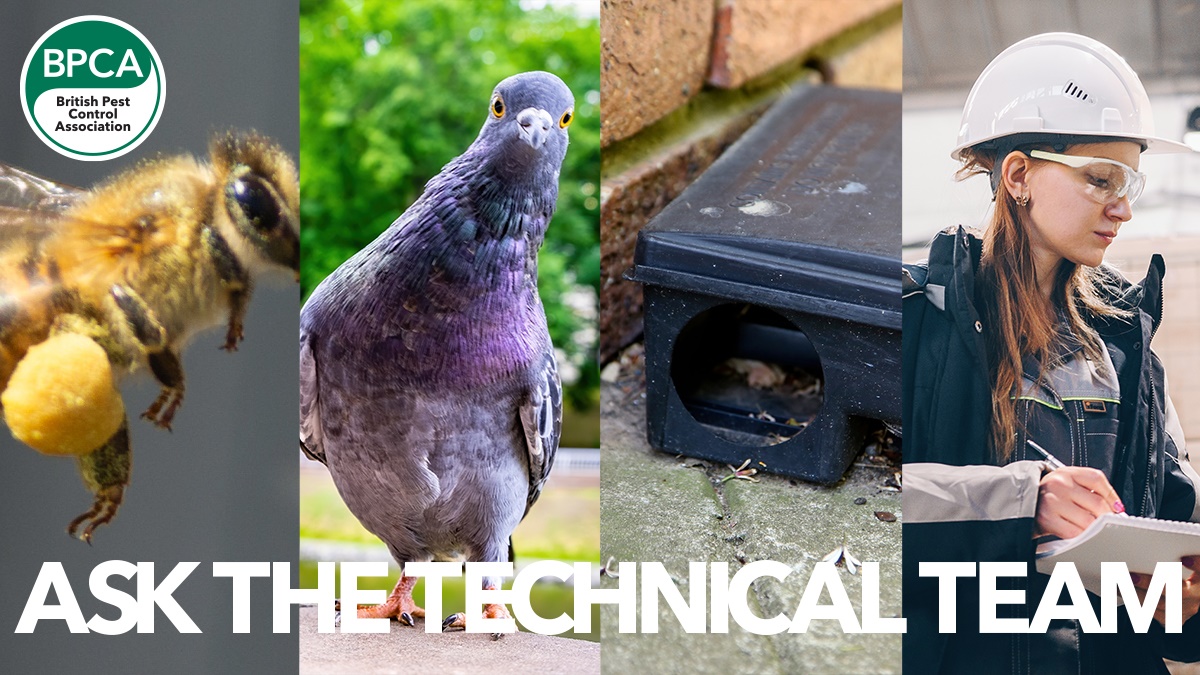PPC118 | Ask the technical team
In this issue of Ask the technical team, we talk bee species, feral pigeons, bait consumption and pest risk assessments.

SPEED VIEW:
- Feral bees are managed honey bee colonies that lose their way during a swarm
- Staying on the right side of the law is crucial with bird control
- Don't underestimate the value of local networking in solving pest problems
- Look at all the factors that build a picture of pest risk in a building.
What’s the difference between honey bees and feral bees?
Honey bees and feral bees are typically the same species in the UK. Feral bees are essentially managed honey bee colonies that became lost during a swarm.
Originally, the term feral meant simply ‘wild or untamed’, but the more common use means ’animals or plants that have lapsed into a wild form from a domesticated condition’.
The term wild or feral may be used interchangeably, as when do we truly decide when a colony moves from being feral to wild?
Feral or wild colonies may often end up in the most unusual of places which is when we as pest management professionals may get a call from a member of the public or property owner wanting them removed.
I have a problem with feral pigeons on site, causing a health and safety issue – What can I do to support my clients?
First, explain the law around bird control to your clients, in that all UK birds, their eggs and nests are protected under the Wildlife and Countryside Act 1981. A full survey should be carried out, and all options examined before implementing a strategy.
Talk them through their options, starting with proofing; things like barriers, spikes, nets and wire can be used to great effect along with the use of deterrents such as audible scarers and optical.
If non-lethal options are considered and deemed impractical, or have not been effective, then you may need to utilise other lawful control measures such as dispatch in line with the appropriate general licence.
Remember, general licences are updated regularly and are different depending on where in the UK your pest business is based.
So read the licence thoroughly to ensure you stay on the right side of the law.
Talk your client through every step of the process: communication is key. If in doubt, check out our guidance documents and codes of best practice in the BPCA Member Library (login req): bpca.org.uk/library
I have issues with rodenticide interactions with mice – How can I improve bait consumption?
Sometimes during a baiting programme, you might come across mice avoiding the rodenticide you have in place.
Some things you might want to try are: switching formulations, bait monitoring stations to a different style/material, or even the use of open bait where the label permits this, inline with your risk assessment.
If you get along well with other local pest professionals, considering talking to them because they may have also come up against the same issue locally.
Local BPCA Forums are a great place to network with other pesties, as well as our large events like PPC Live and PestEx. Check out our events schedule for one near you: bpca.org.uk/events
What does an auditor mean if they are looking for a pest risk assessment?
When looking at a pest risk assessment you should consider how you came to the conclusion that the visit frequency you chose is suitable for your client. Think about:
Building - risk of ingress by pests, age of building, extension work, current or planned building works.
External factors - Condition of exterior grounds, neighbouring properties, is it a high-risk area?
Internally - Site process for unloading and loading goods, does the site produce a high-risk product? Do they receive raw ingredients or product?
Process - Is there a good process for onsite staff for pest activity, do they inspect goods prior to entry, do they quarantine goods? Do they action recommendations accordingly? It is important to make sure you are reviewing this regularly when there is a site change, as this may fluctuate.
You may even consider having more visits in the winter, and fewer in the summer. You can always reach out to a consultant member who can do a field biologist inspection, or act as an independent voice between yourself and your client. bpca.org.uk/consultant
Who you gonna call?
The members of our technical team are happy to come out to visit sites with BPCA members who are struggling with a tough infestation and need hands-on advice. Get in touch!
technical@bpca.org.uk
Source: PPC118